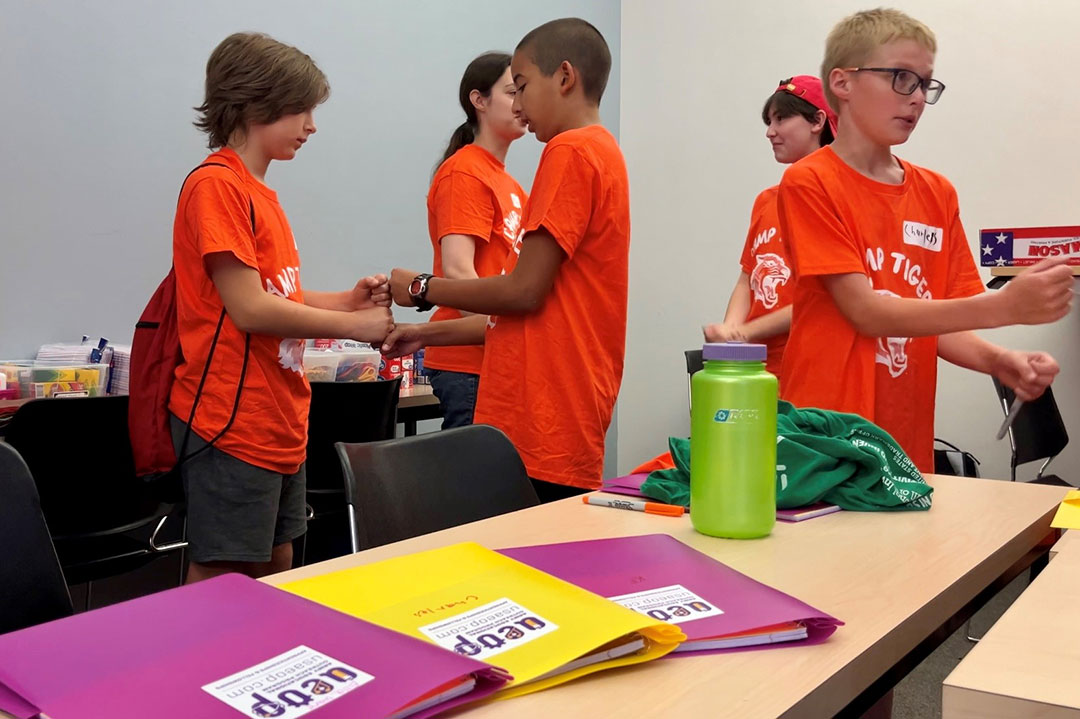Camp Tiger offers free, interactive STEM experiences in collaboration with Army Educational Outreach Program
AEOP Apprenticeships and Fellowships, and Camp Tiger are both administered by RIT’s K-12 University Center
Brit Milazzo
During the third week of Camp Tiger at Rochester Institute of Technology, students enrolled in Community STEM Challenge to find a solution to a real-world problem by conducting research.
Thanks to a grant awarded before the pandemic to RIT’s K-12 University Center by the Army Educational Outreach Program, it allowed funds to go toward free, hands-on STEM experiences for middle and high school students this summer through Camp Tiger. Inspired by AEOP’s eCybermission, and Junior Science and Humanities Symposium, the camp offerings focused on various opportunities through the U.S. Army-based program, in addition to learning skills needed to prepare students to conduct their own research.
The experience even prompted students to pursue further research through the programs, including an 11-year-old with an idea to clean the Nairobi River with a multiuse method that removes waste from the 25-mile-long waterway.
“We received a strategic outreach initiative grant several years ago before we were even awarded the contract to administer AEOP Apprenticeships and Fellowships,” said Donna Burnette, executive director of the K-12 center. “It was to help promote AEOP within our region. We hosted a few activities like the Western New York subregional JSHS competition and ran a big event for eCybermission. With the money left over, and chance to bring back camps this year, it created the opportunity to provide free camps through Camp Tiger to prepare and expose students to those programs.”
According to Assistant Director Heather Storti, who was also overseeing Community STEM Challenge, there were 36 openings this summer for the AEOP-inspired camps. Outreach specialists Kierra McInnis and Miranda Salsbery facilitated the camp called, So you want to be a STEM Researcher?
Held during the second week of camp, So you want to be a STEM Researcher? provided a foundation to prepare campers to embark on STEM research projects with topics including how to find a mentor; components of a strong research project; resources to support high school research, science fairs and competitions; and more. Participants even learned about research at RIT, and gained access to supplemental webinars on STEM careers and pathways. The workshop, aligned with JSHS, a free national STEM research competition sponsored by the Department of Defense.
The Community STEM Challenge workshop allowed campers to apply science, technology, engineering and math to real life by working together to identify a problem in the community and try to solve it using the scientific method or engineering design process. Curriculum for the workshop aligned with the eCybermission program, a free web-based STEM competition for middle school students.
Examples of other research projects include:
• Bed with a built-in alarm and variety of wake-up functions • Built-in monitor with Wii video game device • Healthy options at fast-food restaurants • Hockey helmet improvement to further prevent concussions • Multiuse oven mitts to prevent from heat and slippage • Respiratory machine to help detect ketone levels of individuals with diabetes • Reusable grip pencil that provides a new grip upon wear-out
Some of those research projects addressed infrastructure and environmental issues, access to athletic opportunities, and more.
Elwyn Kuman, 11, lives part of the year in Keyna. He came up with an idea to help clean the Nairobi River, and was called “the human encyclopedia” by his peers.
“It’s filled with heavy metals, bodily waste, other sewage, methane and hydrogen sulfide,” he said. “My treatment plan would aim to remove the methane, hydrogen sulfide and larger plastics that pollute the river using a technique that some use to only remove one product. Using a tube that would produce air bubbles through holes, it could remove the methane and hydrogen sulfide by aerating the water, and channel the waste to shore.”
With an opportunity to invest more time on this project, Elwyn said he hopes to use programs like eCybermission to further promote his research.
“Not only do they bring real problems through the use of science and engineering processes, but we help students learn more about these (platforms), and is (facilitated) by our AEOP staff right here at RIT K-12,” Burnette added.
With a staff of seven, including three fulltime employees, AEOP Apprenticeships and Fellowships is administered by the K-12 University Center at Rochester Institute of Technology on behalf of the U.S. Army. The program provides high school through postdoctoral individuals with paid summer STEM opportunities working alongside professionals at Army lab sites and partner universities across the country.
eCybermission and JSHS are available to students across the country with the chance to earn scholarships, and are supported by AEOP and administered by the National Science Teaching Association.











